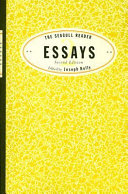
The Seagull Reader Essays
By - Kelly, Joseph
Floor
-
Floor 3
Published
-
W.W. Norton & Co., New York, ©2008
ISBN 10 - 0393930920
ISBN 13 - 9780393930924
Book Status
-
1 Qnty Available with us.
Subject
-
American essays
Shelf No
-
2
Call Number
-
808.4 SEA 2008
Edition
-
2nd ed
Physical Description
-
xi, 439 pages ; 21 cm